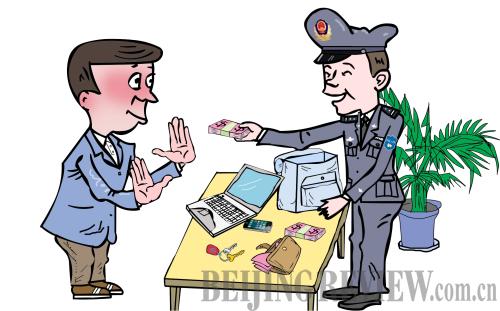|
 |
|
(LI SHIGONG) |
People who return lost property to the owner are expected to be rewarded, according to a draft regulation of Guangzhou, capital of south China's Guangdong Province.
The regulation, which is still soliciting public opinion, says that owners of lost property are encouraged to give finders 10 percent of the value of the lost property as a reward before taking the items back. If the owners cannot be traced, the finders will also be rewarded with 10 percent of the property's value after it is sold by public auction.
The regulation has triggered heated public debate. Supporters regard a reward as a token of appreciation that encourages more people to exercise good behavior. Opponents are concerned that the reward would taint the nobility and good will of the action and degrade the moral character of the public.
Mei Guang (news.qq.com): Rewarding people who have returned lost property is not contradictory to encouraging people to do good deeds. Although an behavior with moral merit, returning lost property to the owner is not the choice of all people. Finders have to keep the lost items properly, look for the owners and return the property. Not all people are willing to do so if they are not rewarded.
The regulation has given finders a right to ask for a reward, which is good for interests of both sides. If implemented, the reward policy will play a positive role in encouraging people to return what they picked up.
The principle of rewarding people who have returned lost property to the owner has been mentioned in several laws of China, such as the Property Law of China. Guangzhou's regulation is in line with the spirit of the law. We should advocate returning lost property for free, but it's more practical to give finders a financial reward for their good deeds.
Lu Kaisheng (news.youth.cn): It's unnecessary to worry that rewarding people who have returned lost property will cause moral deterioration. As for some people's argument that the regulation could be used by people with evil intentions, it's totally nonsense. If finders have evil intentions, they may as well take the lost items and sell them. They wouldn't even bother finding the owners to ask for the 10-percent reward.
Zhu Yonghua (roll.sohu.com): Rewarding people who have voluntarily returned lost property they picked up is a good thought. It will encourage more people to do so. Finders have to keep the lost property carefully, make phone calls to find the owners or hand in the items to the police. It does consume a certain amount of time and energy. A proper reward is totally rational and fair. It is a good way to show people's appreciation of good deeds by giving appropriate compensation.
Jiang Lijuan (Shenzhen Special Zone Daily): Guangzhou's new regulation is in line with the times and shows humane care for ordinary people.
We used to demand people to be flawless in their moral character. But now, we should face the reality. People have all kinds of desires and fears. When making laws or regulations, the government should take into consideration the real conditions of most people rather than idealizing society and people's moral character.
In this sense, Guangzhou's regulation is more feasible because it recognizes differences among people, rather than demanding different people to do the same noble deeds.
If we stick to the traditional thinking of "returning others' lost property for free," finders, in most cases, won't even bother to waste time and energy to find owners or go to the police. Giving finders a financial reward for their good deeds is a balance between owners and finders, as well as between economic gain and morality.
| 